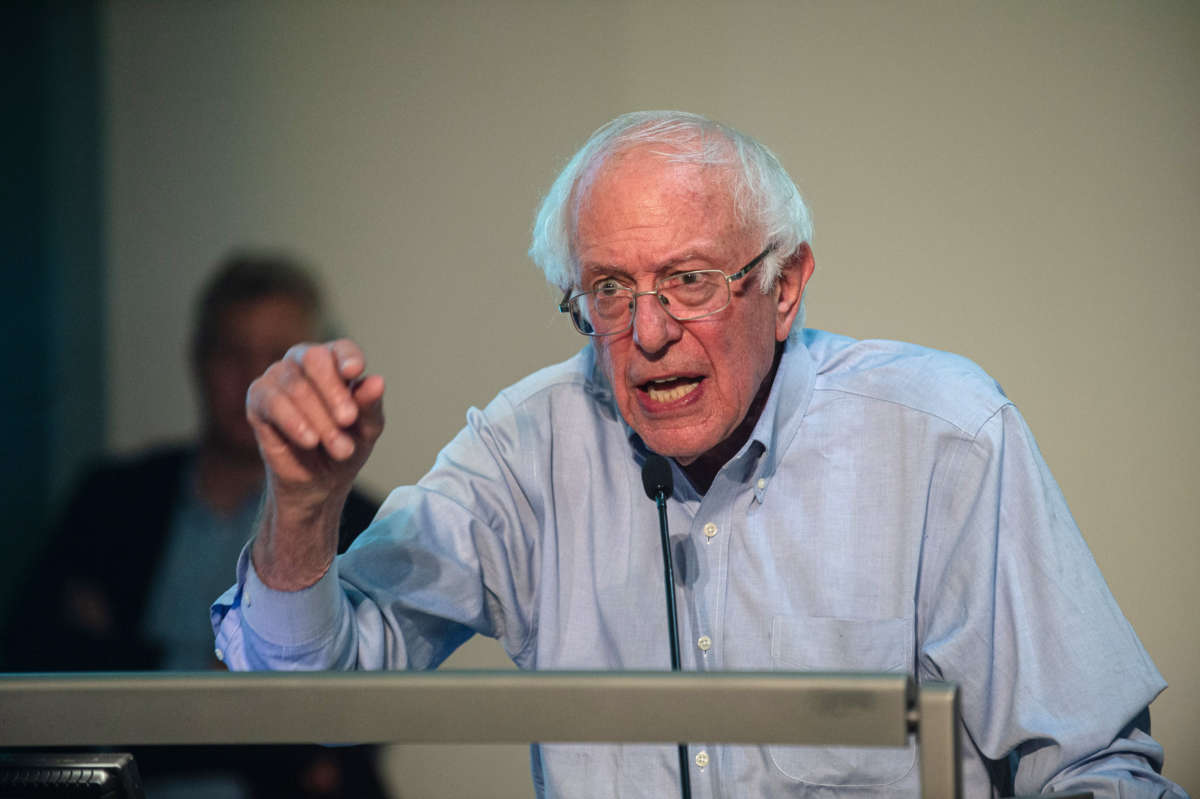Honest, paywall-free news is rare. Please support our boldly independent journalism with a donation of any size.
As a strike by tens of thousands of railroad workers looms, Sen. Bernie Sanders (I-Vermont) is calling on multibillionaire and owner of a parent company involved, Warren Buffett, to listen to workers’ demands and intervene to avert the strike.
Rail workers have been pleading with major freight companies to agree to give workers basic benefits; one of the biggest sticking points, workers say, is that many of them can’t take sick or emergency days, whether paid or unpaid, without racking up points that could lead to their termination. Workers say they’re also expected to be on call 24/7, which exacerbates burnout and exhaustion.
One of the major freight companies that unions say won’t budge on this is BNSF, which is owned by Buffett’s Berkshire Hathaway. As union representatives told The Washington Post, BNSF is also one of the two major rail companies, along with Union Pacific, that are blocking process on negotiations. The group representing the rail companies says that workers aren’t denied sick time.
“In the midst of a potential rail strike, Warren Buffett, the owner of BNSF Railway’s parent company, worth $100 billion, must intervene,” Sanders wrote on Twitter on Tuesday. “During the pandemic, Mr. Buffett became $36 billion richer. He must ensure that rail workers receive decent wages and safe working conditions.”
Two of the 12 unions involved in negotiations have ratified agreements as of Wednesday afternoon, according to the National Carriers’ Conference Committee (NCCC), which represents railroads in negotiations, but there are still a number of negotiations pending involving the largest unions.
Though it is unlikely that Buffett would heed Sanders’s call, it underscores the players of the looming strike, which the unions say can be blamed on corporate greed and “extortion,” as two of the largest unions involved, the Brotherhood of Locomotive Engineers and Trainmen (BLET), Teamsters Rail Conference and the International Association of Sheet Metal, Air, Rail and Transportation Workers (SMART) Transportation Division, said in a joint statement on Sunday.
Indeed, U.S. rail companies are making record profits, as the stock prices for all of the largest railroads – known as Class I railroads – rose in 2021. They have paid out nearly $200 billion in stock buybacks and dividends to shareholders in the past 12 years – and yet, in recent years, have eliminated tens of thousands of jobs and are pushing workers to the breaking point.
BLET President Dennis Pierce says that the unions and the companies aren’t far apart in negotiations – and yet, the companies won’t budge to grant workers their request for a time off benefit.
“All we’re asking is folks to be able to go to routine doctor’s visits without pay, but they have refused to accept our proposals,” Pierce said to The Washington Post. “The average American would not know that we get fired for going to the doctor. This one thing has our members most enraged. We have guys who were punished for taking time off for a heart attack and COVID. It’s inhumane.”
If workers are pushed to strike, it will have major consequences for a large range of industries covering basic needs like energy, water and food. The White House has stepped in on the negotiations, hoping to work out an agreement between the unions.
Republicans in Congress are planning to force a vote on a bill on Wednesday that would force both parties to accept an arbitration agreement, an option that’s favored by conservative lobbyists and railways. It’s expected to be blocked by Democrats.
Sanders spoke out against the move on the Senate floor on Wednesday afternoon.
While industry CEOs and companies are raking in large compensation packages and record profits, Sanders pointed out that workers are being treated inhumanely. “The key issue that is being contested is about the working conditions in the industry which are absolutely unacceptable and are almost beyond belief,” he said.
“What the freight rail industry is saying to its workers is this: it does not matter if you have covid, it doesn’t matter if you’re lying in a hospital bed, it doesn’t matter if your wife just gave birth to your child, it doesn’t matter. If you do not come in to work for whatever reason, we in the industry, we the bosses, have the right to fire you,” he continued.
Matching Opportunity Extended: Please support Truthout today!
Our end-of-year fundraiser is over, but our donation matching opportunity has been extended! All donations to Truthout will be matched dollar for dollar for a limited time.
Your one-time gift today will be matched immediately. Your monthly donation will be matched for the whole first year, doubling your impact.
This matching gift comes at a critical time. As Trump attempts to silence dissenting voices and oppositional nonprofits, reader support is our best defense against the right-wing agenda.
Help Truthout confront Trump’s fascism in 2026, and have your donation matched now!
